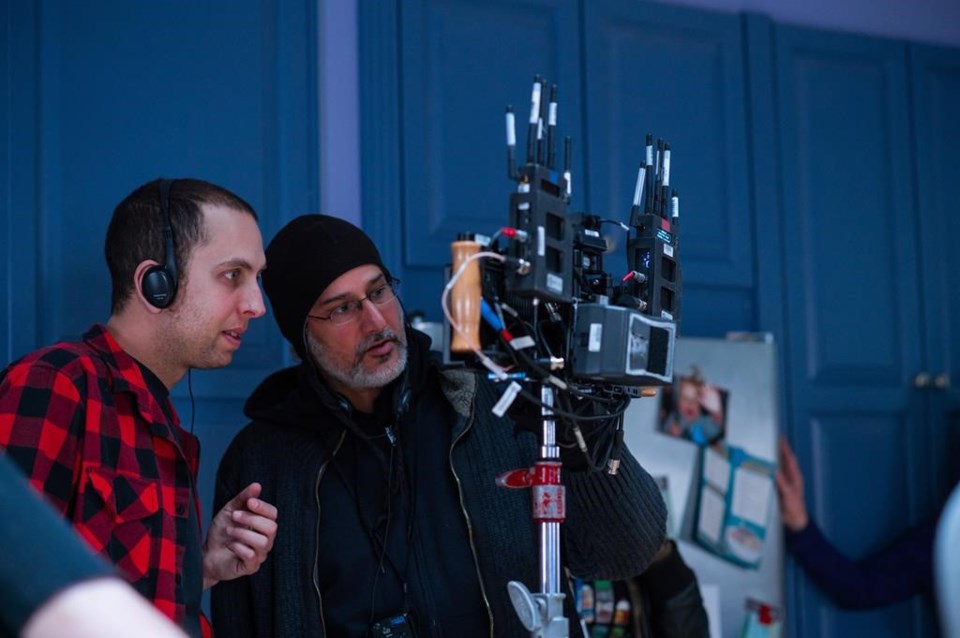TORONTO — Filmmaker Brandon Cronenberg's new sci-fi thriller "Possessor Uncut," about a corporate assassin who takes over people's bodies, came out of what he calls a "strange period" in his life.
The Toronto-based writer-director, who is the son of Canadian body-horror film master David Cronenberg, says a lot of things were in flux for him after exploding onto the scene with his 2012 debut sci-fi feature "Antiviral." And he was having trouble navigating his new reality.
"I was getting up in the morning and feeling like I was sitting up into someone else's life and having to quickly construct some kind of character who could operate in that context," Cronenberg said in a recent phone interview.
"I initially wanted to write a film about someone who may or may not be an imposter in their own life, and use that to talk about the ways that we construct character and narrative just as a way to operate as human beings in a basic way."
The Toronto-shot "Possessor Uncut" is in theatres across Canada on Friday and is Cronenberg's first feature since "Antiviral."
BAFTA-nominated English actor Andrea Riseborough stars in the new film as a corporate assassin who uses a brain-implant machine to possess other people's minds and get them to kill high-profile targets in gruesome fashion.
Christopher Abbott of HBO's "Girls" fame plays one of her pawns, who works for a data-mining company that spies on people through their webcams and is run by his fiancee's father.
Other cast members include Rossif Sutherland as her husband, and Jennifer Jason Leigh as a member of the mysterious corporation behind the brain takeovers.
Cronenberg said American whistleblower Edward Snowden had leaked information about global surveillance programs while he was writing the film, which influenced the story.
"I was feeling extremely angry about it and also depressed, because it was immediately obvious that we're facing the death of privacy through technology," said Cronenberg.
"It's in some ways inevitable, I think, but also quite terrifying. And so in some ways, the body possessions in the film ... can be read as being a kind of extreme form of surveillance."
Cronenberg said a lot of the neuroscience and mind-control technology in the film is taken from experiments Jose Delgado did on animals and humans in the 1950s and '60s. The Spanish Yale University professor used an instrument called stimoceiver to connect to a particular part of the brain and stimulate it electrically with a remote control.
While Cronenberg kept some of the creepy items from the film set, including a robot doll and a mask, he doesn't immerse himself in that world.
"I don't have a house of horrors," he said with a laugh. "And I usually don't take too many props from my films, because once they're done, I kind of want to forget about them."
Given his father's career, it seems a natural fit for Cronenberg to also have an interest in body horror. But the 40-year-old, who has also made numerous short films, said it isn't obvious to him that it's due to his upbringing.
"I mean we're all, to a certain extent, products of our environments," Cronenberg said. "But my films are really just expressions of my own interests and creative impulses. Who knows what that stuff comes from, ultimately."
Part of the reason it took him eight years to make his second feature film is because of "the usual independent film issues," including getting financing and casting together, Cronenberg said.
He also didn't have any other films in development after "Antiviral."
"I didn't really have any kind of career back then," he said. "So in a sense, I had to start over when that was done and start writing and developing from scratch."
Cronenberg doesn't seem to have that problem these days.
He said he's writing a few projects and "fairly far along in development" on two films: "Infinity Pool," which is a tourist resort satire with some sci-fi and horror elements, and the space horror "Dragon."
But does he finally feel like he's established more of an identity?
"I don't know if anyone ever feels like that, honestly," he said with a laugh. "But I'm trying to comfort myself with the thought that that's something that comes later."
This report by The Canadian Press was first published Oct. 1, 2020.
Victoria Ahearn, The Canadian Press



